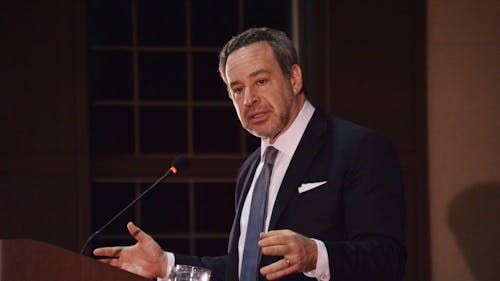David Frum — senior editor at The Atlantic — visits Rutgers, discusses America under Trump

David Frum, a senior editor at The Atlantic, stopped by the Douglass Student Center yesterday for an open conversation on President Donald J. Trump and his latest book “Trumpocracy: The Corruption of the American Republic.”
The event, hosted by the Eagleton Institute of Politics, recognized Frum for his prior work as speech writer and special assistant to former President George W. Bush. He delivered his remarks before accepting questions from a predetermined student audience, and then opened the floor to the general public. After the event, he lingered in the back of the room where he signed copies of his book and greeted fans.
Frum was quick to discuss his thoughts on Trump — outlined in two points which he said served as the basis for the night's discussion.
“One, briefly, about how to understand and how not to understand the problem, the challenge, Donald Trump presents to American democracy,” he said. “And the second, something we don’t talk about enough but that I think is the theme I really want to finish with and that is the reasons for hope in American society. (sic)”
Immediate fears surrounding Trump's election and some of what Frum said inspired his book, come from comparisons made to the collapse of democratic governments in Central Europe and Germany during the 1930s — a significant showcase of democratic breakdown in world history, he said.
Symbolizing the many stops that must be made before a train derailment, Frum said that the current president still works under a modern bureaucratic government that does not grant unrestricted access. The danger comes from anticipating the very worst and ignoring the small moves that could spell a negative situation.
“Donald Trump is not the heart attack of American democracy, he is the gum disease of American democracy,” he said.
Frum said he sees this shift, away from law enforcement that prosecutes criminals for unlawful wrongdoings to a president who controls the status of investigations, as signs of an entirely different country.
He said that despite 2016’s low voter turnout, the lowest since 1942, people now find themselves in the same position.
“What you’re seeing is a kind of national convergence,” he said.
Away from the days where citizens relied solely on guidance from presidents, Frum said people are now beginning to see a separation from one truth to many truths — the dissemination of advanced voices that started at college campuses like Rutgers.
“I think we’ve all gotten a better understanding of the difference between fallible but legitimate and honest journalism and official lying, and we’ve also come to see the danger it has posed when people … are empowered to lie,” he said.
Frum said he considers Trump’s presence as a sort of cleanse, surfacing many of the underlying issues the country faced prior to his election.
“That may be the real value of the Trump years and the real gift, a rediscovery of the central centrality of the value of kindness, not just in personal affairs and as a public area, but in public affairs too … I don’t think it’s a coincidence that the MeToo message of dignity and decency and the treatment between men and women has accelerated so much in the Trump era, the Trump era has been the accelerant of this," he said.
Frum left the audience with three suggestions. The first, to stop fake news — making personal advances to vet fake news in everyday life. The second, to understand that the values that Trump offends daily are ones that everyone should be conscious of.
“Everyone in this room needs to think, you’ve had the advantages of a great educational institution like this or others like it … I think people need to actually start competing to say ‘you know what, I want to talk about the avantages I’ve had and the responsibilities that come with them,'” he said.
Lastly, he stressed that people keep in mind the possibility of a new kind of politics, away from the same answers to the same questions that have kept it stale for years.
“All of this may be about to break, and all we can do is be ready,” Frum said.
He then proceeded to take audience questions that ranged from his time working with Bush, fake news, Trump’s rhetoric and more.
In an interview with The Daily Targum, he gave his impressions of the night along with some advice for media consumers and aspiring journalists at Rutgers.
When asked about how student journalists and media consumers on campus can prepare themselves for the future, Frum said that they should read widely — carving out enough time to make thorough decisions on what is and is not interesting.
He suggested that young voters brush up on their media literacy and pay as much attention to local politics as the presidency.
“Make it a commitment when you go to the ballot never to leave a line blank cause you don’t know enough to cast a decision … government starts from the ground up,” he said.



